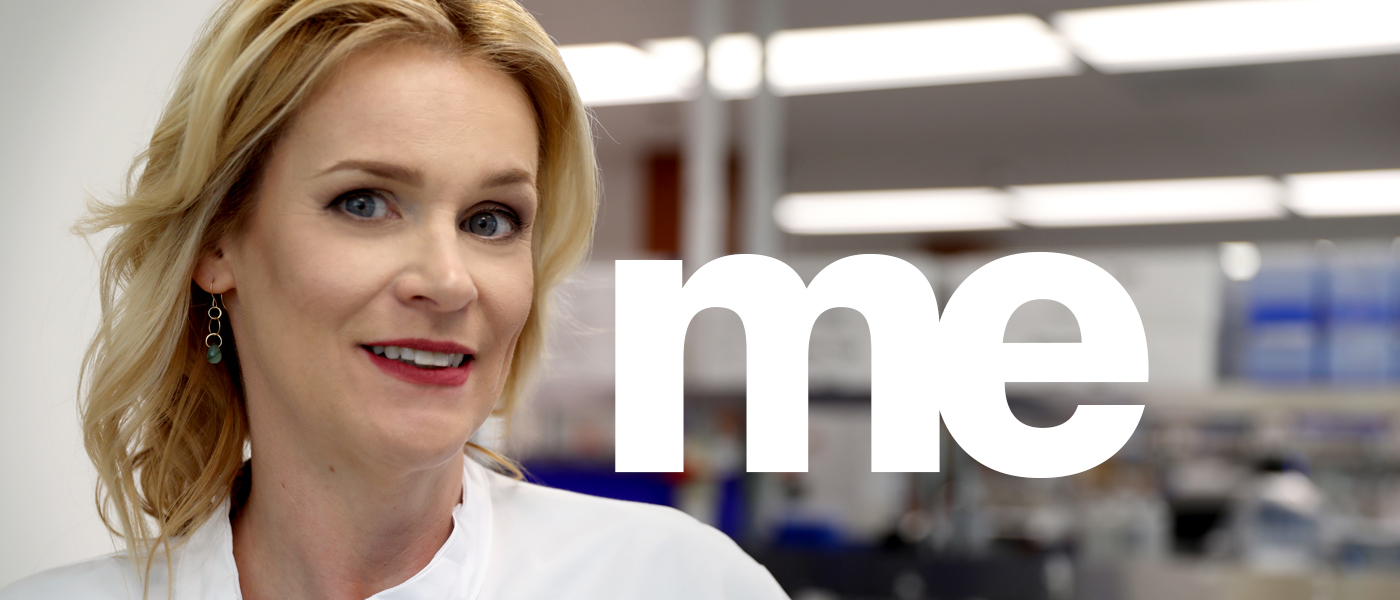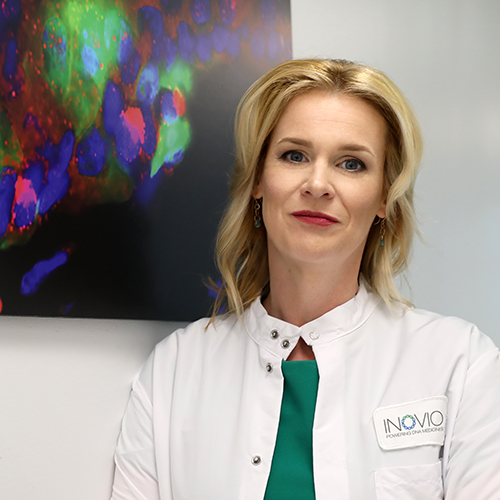
Me by Kate Broderick
Kate Broderick’s study of genetics took her from Gilmorehill to sun-drenched San Diego, where she is Senior Vice President at the biotech company Inovio. Kate (BSc 1999, PhD 2003) and her team specialise in developing DNA medicines and are currently focused on producing a vaccine for COVID-19.
When did you first become aware of this coronavirus?
It’s one of those moments I think I’ll remember forever. It was Hogmanay 2019, I was having my morning cup of tea and looking through the BBC website when I read a story about an as-yet-unidentified pneumonia outbreak in China. As a scientist, I thought, “That’s interesting; I wonder if it’ll come to anything?” Over the next few days, I started to realise that it was fairly serious, but did I think it was going to shut down the entire globe? Definitely not.
At what stage is Inovio’s vaccine?
We began designing a vaccine as soon as we received the DNA sequence of the virus, and completed it in three hours. We started preclinical testing in January and have now begun a clinical trial to check that the vaccine produces the right kind of immune response. Going from receiving the sequence to treating our first subject in 83 days is extremely fast. [According to The Guardian, Inovio is one of the frontrunners in the quest to develop a vaccine for the novel coronavirus.]
How does it feel to be part of a worldwide effort to develop a vaccine?
We’re working with many partners, academic, industrial and governmental. That’s been one of the really positive things about this outbreak, the global solidarity in the scientific community of people coming together and sharing knowledge. We’re still learning about this virus and approaching the task of finding a vaccine as a single goal that we are all working towards.
"When we posted that we were starting our clinical trials, the phones were ringing off the hook with people wanting to volunteer. We could have filled the enrolment many times over.
When the world has a viable vaccine, how long will it take to manufacture enough to meet the global demand?
When we think of the global need for this vaccine, we’re actually talking in the hundreds of millions, if not billions. I think 12 to 18 months is a fairly realistic goal for a vaccine to become available, maybe not to the whole population but to healthcare workers and people with underlying conditions.
What inspired you to go into your line of work?
The chance to join an organisation right at the start of developing DNA medicine technology. This is where we create medicines using parts of the genetic sequence rather than with weakened forms of the virus, which is how standard vaccines are produced. They take three to five years to develop, and we just don’t have that time at the moment, so this is where DNA vaccines come in. We can respond in a very short time.
How would you describe the atmosphere in your laboratory during these unprecedented times?
The team of people that I work with have always been amazingly dedicated, even before the start of this outbreak. But what I’ve seen from them over the last few months has been incredible. Everybody is here, working day and night to move as fast as we can to get this vaccine through all the relevant testing. They are completely focused on coming up with solutions.
COVID-19 has touched the lives of many. Is working on a vaccine a personal as well as a professional quest?
My husband is immuno-compromised, so we have had to take lots of precautions from day one, which is difficult with two young children. My sister is frontline NHS staff in Glasgow, and we’re so proud of the efforts of her and her colleagues, literally putting their lives on the line to make sure people are being taken care of.
"It's so amazing to see what the University has done in a short period of time. The testing efforts are absolutely key, and you guys are clearly leading the way.
Once a vaccine is in circulation, how do you think your focus will change?
It’s one of these massive unknowns. Is this virus one that will disappear, or will it be more like influenza, reappearing on a seasonal basis? Either way, there’s no doubt in my mind that something like this will happen again. I think much of my work in the future will be seeing what we can learn from what has happened in 2020 and what we can do to ensure we’re better prepared next time.
Memories of Glasgow
I chose to come to Glasgow for many reasons. I lived my whole young life on the east coast of Scotland, so it was always nice to come over to the west. I had a lot of family ties to Glasgow and have always loved the city, so it was a real honour to be able to go to university there.
For the first two years, I’m not sure if I had the best attendance record! I loved the QMU and was a regular attendee of Cheesy Pop, but as the years progressed, I made more of an effort. The education was invaluable, but the friendships and amazingly fun times were irreplaceable.
Dr (now Professor) Kevin O’Dell was an absolutely fantastic lecturer, someone who could really engage an audience. I’m really grateful for the support of my two PhD supervisors as well, Professors Julian Dow and Shireen Davies. I have a lot of fond memories of those three.
I’m incredibly grateful for the opportunities that my time at Glasgow afforded me, and there’s no doubt in my mind that without the education and social enrichment I got during my time there, I certainly wouldn’t be in the position I am today.
Kate is currently focused on the battle against COVID-19, but is also looking to the future, when she and her company will be able to continue working on vaccines for other devastating diseases such as Ebola, Zika and HIV. Thinking ahead, she also hopes to spend more time doing the things she loves, such as DIY in her house and garden. “I don’t know when that’s going to happen,” she says, “but I hope it will at some point.”
This article was first published June 2020.

Photo: Inovio
QUICKFIRE
Biggest hero?
Nelson Mandela. Plus, Dolly Parton is a pretty phenomenal woman! And my husband, who has tackled some difficult things in his life and yet still remains positive.
Greatest achievement?
My two children.
Biggest challenge?
Moving to the States. I was a bit naive and underestimated how hard it would be, but I don't regret it for a second.
Most treasured possession?
One of the rings my mum gave me before she died.
Guilty pleasure?
Big glasses of wine!
Biggest extravagance?
Definitely my home, but I love every second that I'm in it.
Happiest memory?
My wedding. We got married outside on a beautiful sunny September day. What are the chances of that in Scotland?
Favourite place in the world?
Blair Atholl in Perthshire, where I spent pretty much every summer as a child. I've taken my own kids back there many times.

